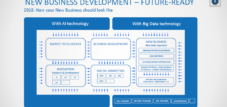Growth strategies for companies: The diverse role of the Pioneer Business Development Consultant (Business Developer)
Language selection 📢
Published on: July 8, 2023 / update from: July 30, 2023 - Author: Konrad Wolfenstein

External support as a success factor: The importance of business developers, management consultants and freelancers for the growth of companies - Image: Xpert.Digital
Pioneer Business Development: The Art of Innovation and Business Development
The 'Pioneer Business Development' is actually a relatively new and specialized area that has become more important in recent years. It is not an apprenticeship in the conventional sense, but a function or area of responsibility that exists in various companies.
Essentially, Pioneer Business Development is about identifying and driving forward innovative approaches and business opportunities. As a Pioneer Business Developer, my job is to present complex relationships and events in a concise and understandable way, often in the form of 1-3 page presentations.
My daughter recently asked me what I do for work. Understandably, she could not do anything with the term 'Pioneer Business Development' (PBD). She asked questions like: Is there a special apprenticeship for it? Do you sell something? What exactly do you do in this area? Why is it important at all? It was always a challenge to give her a new explanation.
This was and is a tricky situation for me personally, because my main task as a PBD is, among other things, to present complex and often little-known connections and events in an understandable and clear manner in 1-3 page presentations.
When my daughter then became in demand at school, she said that I was doing anything with IT. I tried to explain it a little more precisely and mentioned the term 'business IT specialist', but of course that was not sufficient. Because what exactly is a business IT specialist? This started the question from the front.
What distinguishes my job is the constant self-reflection in order to gain new insights. I always have to start over, admit mistakes and learn from them. It's about taking on the challenges and achieving success by going two steps ahead and sometimes even falling three steps back. Because success is not always linear, but rather multi-layered. Success cannot be reduced to a specific point or goal, because often the best insights and the most successful directions arise from unpredictable sources. If the competition was already present there, the Pioneer Business Development would be worthless.
It is important to understand that my job is much more than just selling products or services. As a Pioneer Business Development Consultant, it's all about finding innovative approaches and strategically developing the company. It's about identifying new business opportunities, opening up new markets, forming partnerships and introducing innovative technologies.
The world of business development is dynamic and requires flexibility, creativity and constant development. As a Pioneer Business Development Consultant, I have the opportunity to explore new avenues and make a significant contribution to the success of the company. It is an exciting and challenging task that requires a broad horizon of knowledge and experience while at the same time offering space for personal growth and shaping the future.
Business development in focus: synergies, partnerships and innovation for future-oriented companies
Business development is a diverse area within companies that deals with identifying, developing and maximizing new business opportunities. The primary role of business development is to drive the growth and success of a company by developing strategic partnerships, customer relationships and market opportunities.
An essential part of business development is market analysis. Business developers conduct extensive research to understand the market and identify potential business opportunities. They analyze market trends, competitor activity, customer needs and technological developments to make informed decisions. Having detailed knowledge of the market allows them to develop strategic plans based on market conditions and the company's goals.
Strategy development is another important aspect of business development. Based on the results of market analysis, business developers develop long-term plans to promote the growth of the company. You identify target markets, define market entry strategies and develop business models to maximize sales potential. They take into account both the company's current strengths and possible future growth areas.
Partnerships and collaborations play a crucial role in business development. Business developers look for opportunities to work with other companies to create synergies and develop new business areas. You establish contacts with potential partners, conduct negotiations and conclude partnership agreements. These partnerships can take the form of distribution agreements, technology transfers, joint ventures or strategic alliances. Through such collaborations, companies can open up new markets, expand their reach and benefit from the strengths of their partners.
Another important aspect of business development is customer acquisition. Business developers are responsible for acquiring new customers and strengthening existing customer relationships. You develop effective acquisition strategies to address potential customers and convince them of the company's products or services. This also includes maintaining relationships with existing customers to build long-term partnerships and increase customer value. Business developers often work closely with the sales team to understand customer requirements and offer tailored solutions.
Product development is another important area of activity in business development. Business developers work closely with product management to develop new products or services or improve existing offerings. You collect feedback from customers and the market to generate innovative product ideas and support their implementation. By working closely with product management, they ensure that the products developed meet customer needs and offer competitive advantages.
Business developers are also trained in conducting business analysis. They monitor and analyze business data to evaluate the effectiveness of their strategies and actions. They track financial indicators, performance indicators and the return on investment (ROI) of their activities. By analyzing business data, they can gain insights, make possible adjustments, and evaluate the chances of success of their business development efforts.
➡️ Business development is a multidisciplinary area that requires various skills and competencies. Business developers must have both strategic thinking and strong interpersonal skills. You must be able to identify opportunities, negotiate, build relationships and develop business models. Through their work, they make a significant contribution to the growth and success of a company by opening up new business opportunities and strengthening the competitive position.
📣 Advice on possible uses of our Pioneer Business Development for your areas
For us, it's not just about the application of Pioneering Business Development at the C-level management level, but also about its practical use in various specialist areas. Whether in marketing, trade fair and event management, product development, sales or other areas - our goal is to help you exploit the full potential of Pioneer Business Development. We work with you in-house to develop tailor-made solutions and support you in implementing innovative approaches and strategies in your company. Let's explore the path of Pioneer Business Development together and discover the opportunities for your specific areas of expertise.
Business Development: Understanding market trends, gaining competitive advantages, identifying opportunities, developing strategies, driving success
Business development is an area in companies that deals with identifying and developing new business opportunities. The primary role of business development is to drive the growth and success of a company through the creation and development of partnerships, customer relationships and market opportunities.
The exact tasks of business development can vary depending on the company and industry, but here are some typical activities performed in this area:
1. Market analysis
Business developers analyze the market to identify potential business opportunities. They examine market trends, competitors, customer needs and new technologies to identify opportunities for the company.
2. Strategy development
Based on market analysis, business developers develop strategic plans to drive the company's growth. You identify target markets, define market entry strategies and develop business models to maximize sales potential.
3. Partnerships and collaborations
Business developers look for opportunities to collaborate with other companies to create synergies and develop new business areas. You conduct negotiations, conclude partnership agreements and maintain relationships with business partners.
4. Customer acquisition
An important aspect of business development is acquiring new customers and strengthening existing customer relationships. This can be done through acquisition activities, networking, sales strategies and the development of customer-specific solutions.
5. Product development
Business developers work closely with product management to drive the development of new products or services. You collect feedback from customers and the market to generate innovative product ideas and support their implementation.
6. Business analytics
Business developers monitor and analyze business data to evaluate the effectiveness of their strategies and actions. They track financial indicators, performance indicators and the return on investment (ROI) of their activities.
➡️ Business development aims to strategically develop the company by identifying new business opportunities, building partnerships, acquiring customers and expanding the product offering. It is a holistic approach to ensure the long-term growth and success of a company.
Good question: How do you become a business developer?
To pursue a career as a business developer, there are various paths that can lead to this versatile and exciting profession. Although there is no set training or educational path that leads to a job as a business developer, there are certain knowledge, skills and experiences that are beneficial for this career field.
Educational background
A bachelor's degree in business administration, economics, marketing, or a related field is often advantageous because it provides a solid foundation in business fundamentals. Some companies may also prefer a master's degree, especially if it is focused on the business development field.
Industry-specific knowledge
Depending on the industry in which the company operates, it may be advantageous to have industry-specific knowledge. For example, a technical understanding in the IT industry or renewable energy sector could be useful in identifying and developing innovative business opportunities.
Practical experience
Internships or professional experience in relevant areas such as sales, marketing, product management or management consulting can help develop the necessary skills for business development. These experiences enable aspiring business developers to develop a deeper understanding of business processes and gain valuable insights into different areas of the company.
Analytical skills
Business developers must be able to analyze complex information and make informed decisions. Analytical skills, including data analysis, market analysis and financial evaluation, are therefore of great importance. Knowledge of various tools and methods for data analysis and market research can be helpful here.
Communication and negotiation skills
Business developers often deal with various stakeholders, including potential partners, customers, and internal teams. Therefore, excellent communication skills, both oral and written, are essential. At the same time, good negotiation skills are important to finalize partnerships and reach agreements that are beneficial to all parties involved.
Entrepreneurial thinking
Business developers must have a strong entrepreneurial mindset and be able to identify and implement opportunities. You should be creative, develop innovative ideas and be able to assess risks. Understanding the company's business goals and the ability to create strategic plans are essential qualities of a successful business developer.
Network and relationship management
Building a network and maintaining relationships is very important for business developers. The ability to make contacts, identify collaboration opportunities and build long-term relationships supports success in developing new business opportunities.
➡️ The requirements for business developers can vary depending on the company, industry and position. Some companies may prefer candidates with more technical skills, while others may emphasize sales experience. Continuous training and following industry trends are crucial to remaining competitive as a business developer.
➡️ A combined educational background, practical experience, analytical skills, communication skills, entrepreneurial thinking and a strong network are the foundations for a successful career in business development. By developing these skills, aspiring business developers can increase their chances of getting a job in this exciting and dynamic field.
Advantages of a diverse skillset: Why technical skills are important in business development
➡️ The all-rounder in business development: Industry knowledge is the key and flexibility and adaptability with the technical skills make the difference.
It is definitely an advantage if a business developer has technical skills in various areas. The skills and industry knowledge mentioned can expand the profile of a business developer and make him a versatile and valuable employee. Here are some reasons why these additional skills and knowledge can be beneficial:
1. Holistic understanding
Through skilled skills in areas such as server hosting, programming, search engine optimization, advertising campaigns, copywriting, graphic design and XR technologies, a business developer can develop a comprehensive understanding of the various aspects of the business. This allows him to better communicate with different teams and departments and understand their needs. A holistic approach can also be beneficial when developing innovative business solutions.
2. Effective communication
The ability to understand and communicate technical language and concepts from different areas allows a business developer to interact effectively with subject matter experts, customers and other stakeholders. For example, understanding search engine optimization can help develop marketing strategies that improve the company's visibility and reach. The same applies to copywriting, graphic design and mastering XR technologies to create creative content and optimize customer interactions.
3. Identify market opportunities
Industry knowledge in mechanical engineering and photovoltaics can help a business developer identify specific market opportunities and potential. By understanding the technical aspects and requirements of these industries, a business developer can specifically look for opportunities to offer innovative solutions and form partnerships with other companies. This can support the growth and success of the company.
4. Adaptability
The business development process can vary depending on the industry and technological advancements. A business developer with a broad range of technical skills and industry knowledge is better equipped to adapt to change and identify new business opportunities. This enables him to react agilely to market changes and move the company forward.
➡️ Not all business development roles require specific technical skills. It depends on the industry, the company and the position. There may also be opportunities to learn these skills in-house or work with subject matter experts to implement specific projects. Ultimately, it is crucial that a business developer has a solid foundation in the core areas of business development and is able to think strategically, build partnerships and drive the growth of the company.
Nevertheless, the skills and knowledge mentioned below can expand the profile of a business developer and make him a versatile and valuable employee. Here are some reasons why these additional skills and knowledge can be beneficial:
1. Server hosting and programming
As a business developer who has knowledge of server hosting and programming, you can support the company in developing and implementing technical solutions. For example, you can contribute to the development of online platforms, e-commerce systems or custom software solutions. This allows you to better understand how technological developments can impact business and identify innovative solutions.
2. Search Engine Optimization (SEO)
SEO is a crucial aspect of marketing and can significantly improve a business's visibility and reach. As a business developer, if you have knowledge of search engine optimization, you can develop strategies to strengthen the company's online presence, improve organic search and increase website traffic.
3. Writing advertising campaigns and texts
Understanding advertising campaigns and the ability to write persuasive copy are crucial to attracting customers and promoting the company. As a business developer, you can help develop and implement effective marketing campaigns by creating targeted content that engages audiences and leads to customer conversions.
4. Graphic design and Photoshop
Graphic design is an important part of visual marketing. If you have graphic design skills and mastery of tools like Photoshop, you can create high-quality marketing materials, infographics, presentations, and visuals for the company. This helps to strengthen brand perception and differentiate the company from the competition.
5. Metaverse and XR technologies
The Metaverse and XR technologies such as Augmented Reality (AR), Extended Reality (XR), Mixed Reality (MR) and Virtual Reality (VR) are becoming increasingly important. If you have experience in these areas, you can help the company develop innovative solutions that improve customer interactions, create immersive experiences and explore new market opportunities.
6. Industry knowledge in mechanical engineering and photovoltaics
Industry knowledge is always valuable, especially when it relates to the business developer's tasks. Having expertise in mechanical engineering and photovoltaics will enable you to make informed decisions, identify potential business opportunities and build strategic partnerships in these specific industries.
➡️ Having these technical skills and industry knowledge can enable a business developer to proactively respond to changes in the market, develop innovative solutions and support the company in a versatile and comprehensive way. It is important to consider the specific needs of the employer and focus on developing a wide range of skills that will enable the business developer to effectively achieve business goals.
Is there a training course to become a business developer?
There is no specific apprenticeship that is aimed exclusively at business developers. The business developer profession is more of a position that is achieved based on experience, skills and knowledge in various areas. However, there are related apprenticeships and courses that can lay the foundation for a career in business development.
Business Administration (Business Administration)
Studying business administration, whether at a university or technical college, offers comprehensive training in the fundamentals of business life. It covers areas such as business management, marketing, strategy, finance and project management. A business degree provides the fundamental knowledge and concepts that are beneficial for a career in business development.
business Informatics
A degree in business informatics combines business aspects with IT knowledge. It teaches skills in data analysis, IT management and business process optimization. Since business development is closely linked to technology and digital transformation, a background in business information technology can be an advantage.
Marketing and communication
Studying or training in the field of marketing and communications can also provide a solid foundation for a career in business development. It provides knowledge about market analysis, customer acquisition, advertising campaigns, customer communication and branding - all important aspects of business development.
Sales and customer relationship management
Training or studying in sales and customer relationship management can also develop valuable skills for a career in business development. Learning sales techniques, negotiating and building customer relationships lays the foundation for developing business opportunities and attracting new customers.
➡️ Formal training or a degree alone is not enough to become a successful business developer. There is a need for additional practical experience, ongoing training and the development of the necessary skills to work effectively in this field. Internships, professional experience and targeted further training can help to build the necessary knowledge and practical experience.
➡️ The path to becoming a business developer also depends on individual interests, strengths and career goals. It is possible to enter the field of business development as a career changer by leveraging your skills and experience in the areas mentioned above and continually working to develop yourself further in this dynamic field.
➡️ In many cases, the path to becoming a business developer is not linear. There is room for career changers who switch to business development based on their experience in the areas mentioned or based on their knowledge of specific industries. Ultimately, a combination of education, training and practical experience is crucial to gaining the skills necessary for a successful career in business development.
Here are some common terms for external business developers
Business Development Consultant
Business development consultants are specialized consultants who focus on developing business opportunities and increasing a company's revenue potential. They provide strategic advice, market analysis, partnership development and support in the implementation of business plans.
Business consultant
Business consultants are external professionals who help companies develop and implement business strategies and growth plans. They offer their expertise and expertise in various areas of business development and work closely with the company's internal teams.
Interim manager
Interim managers are experienced professionals who are temporarily deployed to companies to tackle specific projects or challenges in the area of business development. They can act as external leaders and support the company in identifying business opportunities, implementing changes and optimizing processes.
Freelancer
Freelancers in the field of business development offer their services on an independent basis. You work on a project basis and can support companies with specific tasks or projects in business development. Freelancers can bring specialized skills and expertise in areas such as marketing, sales or partnership development.
The advantages of working with external business developers are manifold
Specialist knowledge and expertise
External business developers often bring specialized expertise and extensive experience in various industries. You can bring new perspectives and innovative solutions with a fresh look at the company and the market.
Objectivity and impartiality
External business developers are independent and have no internal biases or political influences. They can conduct more objective analysis and make neutral recommendations based on the best interests of the company.
Flexibility and efficiency
External business developers can react flexibly to the needs of the company and use their resources in a targeted manner. You can quickly step in to address bottlenecks, advance projects, or provide specific expertise without the need for lengthy hiring processes or training.
Network and contacts
External business developers often have an extensive network and valuable contacts in various industries. This can benefit the company by gaining access to new partnerships, customers or collaboration opportunities.
Cost savings
Working with external business developers can be more cost-effective than hiring internal employees. Companies can use the services of external experts as needed and do not have to enter into long-term employment contracts or additional wage costs.
➡️ The benefits of external business developers depend on the specific situation and requirements of the company. In some cases, it may make sense to use internal resources and handle business development tasks internally. However, for complex projects or a specific need for specialist knowledge and experience, external business developers can offer valuable support and contribute to the success of the company. As a further alternative, Xpert offers an in-house solution that supplements internal resources.
What differentiates the Pioneer Business Development Consultant from the normal Business Development Consultant?
The Pioneer Business Development Consultant differs from a regular Business Development Consultant in a few important ways.
Innovation orientation
The Pioneer Business Development Consultant is characterized by a pronounced innovation orientation. He always strives to identify and advance new and innovative business opportunities. Unlike a normal business development consultant who often focuses on existing business models and proven strategies, the Pioneer Business Development Consultant is always looking for disruptive approaches and groundbreaking ideas to move the company forward.
Willingness to take risks
The Pioneer Business Development Consultant is willing to take risks and explore unconventional paths. He recognizes that innovation is often associated with uncertainty and risk, but also with high potential for growth and success. In contrast, a regular business development consultant typically places more emphasis on hedging risks and following best business practices.
Market forecast
The Pioneer Business Development Consultant has a deep understanding of market trends and can react to changes at an early stage. He identifies emerging markets, technological developments and customer needs before they are widely known. In contrast, a normal business development consultant can also carry out market analysis, but is more likely to focus on current market conditions and existing opportunities.
Disruptive strategies
The Pioneer Business Development Consultant develops disruptive strategies to open up new markets and gain competitive advantages. He thinks beyond traditional business models and recognizes the potential of new technologies, new partnerships or other innovative approaches. In contrast, a regular business development consultant often focuses on optimizing existing business processes and identifying growth opportunities within the existing framework.
Joy of experimentation
The Pioneer Business Development Consultant is keen to experiment and open to new approaches. He is willing to test new ideas, develop prototypes and introduce iterative processes in order to react quickly to feedback and market developments. In contrast, a normal business development consultant often prefers a more planned and less risky approach.
Building a pioneering culture
The Pioneer Business Development Consultant promotes a pioneering culture within the company. He encourages employees to think innovatively, bring in new ideas and step out of their comfort zone. It creates an environment that supports experimentation, learning and growth. In contrast, a regular business development consultant may focus more on implementing existing business strategies and improving processes.
➡️ Not every business development consultant is automatically a pioneer business development consultant. The qualities and characteristics of a Pioneer Business Development Consultant often develop through experience, training and a deep understanding of the market and industry. Not every company needs a Pioneer Business Development Consultant, but for companies that want to focus on innovation and disruption, a Pioneer Business Development Consultant can make a difference.
From 'normal' business development to Pioneer Business Development (PBD)
I would be happy to serve as your personal advisor.
You can contact me by filling out the contact form below or simply call me on +49 89 89 674 804 (Munich) .
I'm looking forward to our joint project.
Xpert.Digital – Konrad Wolfenstein
Xpert.Digital is a hub for industry with a focus on digitalization, mechanical engineering, logistics/intralogistics and photovoltaics.
With our 360° business development solution, we support well-known companies from new business to after sales.
Market intelligence, smarketing, marketing automation, content development, PR, mail campaigns, personalized social media and lead nurturing are part of our digital tools.
You can find out more at: www.xpert.digital – www.xpert.solar – www.xpert.plus


























